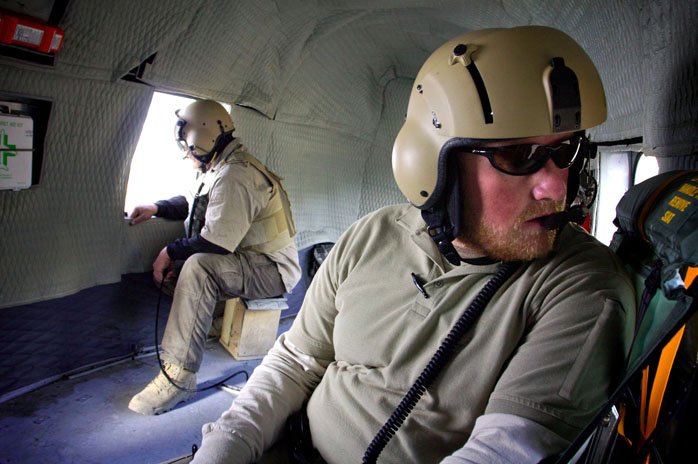With President Obama addressing the nation tonight about a new escalation in Afghanistan, a perennially underexamined topic is once again receiving short shrift: the huge force of contractors, which as of June outnumbered the size of the U.S. troop presence itself, is likely to swell.
The Administration seemingly hasn’t addressed the issue, and the word “contractor” doesn’t appear much in media coverage — for example, in the Times and Post stories on the escalation today.
But David Berteau, a senior adviser at the Center for Strategic and International Studies, tells TPM that as Obama increases troop levels to at least 100,000, “there will definitely be an increase in the number of contractors.”
The contractors — the majority of whom are Afghan nationals, according to a Congressional study — do the work that makes the war possible, like serving food, driving trucks, constructing buildings, transporting fuel, and more. Between 7% and 16% of the total are Blackwater-style private security contractors, according to various estimates.
While contractors allow the U.S. to fight wars with fewer American troops — which may be good or bad, depending on who you ask — they also present serious transparency and security concerns. That includes goodwill-draining episodes like the May shooting of two Afghan civilians in Kabul by contractors working for Xe, formerly Blackwater. Experts are also concerned about an attack by enemies who might slip through security as a contractor at an American facility.
It’s impossible to say how much taxpayer money is going to private contracts because various government entities either don’t know, or don’t agree on, just how many contractors are currently in Afghanistan.
That fact “permits and invites waste, fraud and abuse of taxpayer money and undermines the achievement of US mission objectives,” Michael Thibault, co-chair of the bipartisan Commission on Wartime Contracting, complained at a hearing last month. At that hearing, military witnesses couldn’t come up with a precise count of contractors, prompting former GOP congressman Chris Shays to remark, “I kind of want to scream.”
After being bounced around to several DOD offices in the United States and Afghanistan that professed ignorance about the number of contractors, a U.S. Central Command spokesman told TPM today the issue would take some time to look into, and he would get back to us.
The best count we and the experts we spoke with could find is a September study by the Congressional Research Service, with numbers through June provided by the military. It notes that last December, contractors made up 69% of the DOD workforce, “the highest recorded percentage … in any conflict in the history of the United States.”
The number of contractors in Afghanistan as of June was 73,968, compared with 55,107 troops. Of the total contractors, about 10,000 are Americans, 51,000 are locals, and roughly 12,000 are third-country nationals. Take a look at this graph from the study:

It’s not just discussions of troop levels — which typically ignore contractors — that obfuscate the size of the American commitment in Afghanistan. According to a powerful ProPublica/Los Angeles Times piece, almost 1,600 civilian workers have died in the Iraq and Afghan wars.
“Since the end of the Cold War the US government has become extremely comfortable with contracting out certain military functions to the private sector, and therefore doesn’t consider these contractors to be part of the American commitment,” says Peter Juul, a researcher at the Center for American Progress. “They’re off the books and don’t really count, even though you have to pay for them.”
The White House said today that each additional 10,000 troops will cost roughly $10 billion. But does that number include any increase in the contractor force? It’s not clear.
A comprehensive study of the issue by the Commission on Wartime Contracting, created by Congress in 2008, is due in the summer of 2011.
Finally, it’s worth noting that Hamid Karzai recently promised to kick out all foreign private security firms and transfer their duties to Afghans within two years. But analysts told Mother Jones they don’t think the promise is worth much.
Late 12/2/09 Update: The military gives us a new figure on contractors in Afghanistan: 104,100.






